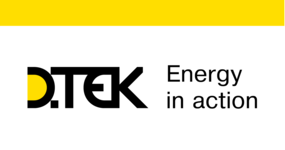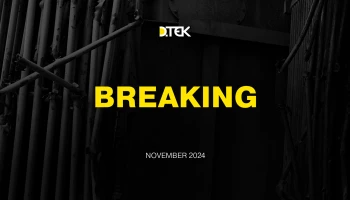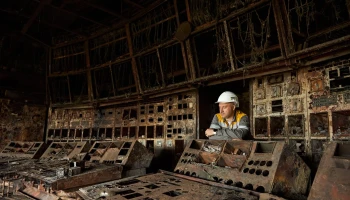In the current digital era, enterprises heavily rely on their network infrastructure to support critical operations, facilitate uninterrupted communication, and ensure efficient data flow. However, traditional networks only sometimes meet the demands of modern businesses, which is why they are gradually being replaced by innovative architectures such as Software-Defined Wide Area Network (SD-WAN).
The system integrator Netwave, in collaboration with the IT company MODUS X, implemented this architecture for the DTEK Group in Ukraine. How much time was required to deploy one of the most extensive SD-WAN architectures in the country? What benefits did it provide? And how was such a complex project successfully implemented amid the war? Let’s delve into the DTEK Group case.
MODERN APPROACH TO BUILDING CORPORATE NETWORKS
In the dynamic business landscape, adaptability is a must. Enhancing the efficiency of business processes and workforce, incorporating advanced technologies, and, most importantly, reacting responsively to changing demands are all aspects that remain in focus not only for DTEK Group’s businesses but also for other Ukrainian enterprises operating in the current war conditions.
SD-WAN architecture is changing the game’s rules as it represents a true revolution in managing and optimizing corporate networks. With its assistance, enterprises gain flexibility and scalability, improve their productivity and cost-effectiveness, and enhance the user experience.
According to Andriy Kolosov, an engineer from MODUS X specializing in SD-WAN implementation, this technology allows to overcome the challenges of traditional networks, such as complex configuration and management, equipment and maintenance costs, and a significant amount of routine work that leads to errors and burdens the staff. “Software-defined networking provides a new level of user experience, manageability, productivity, and security compared to the traditional approach. The high flexibility and scalability of SD-WAN architecture enable the creation of a reliable foundation for launching modern applications and services, including cloud-based ones,” the expert noted.
SD-WAN architecture provides network professionals complete control and convenient, centralized network management through a single interface. Routine network management operations are automated, eliminating the need for complex and time-consuming manual configuration of each network device individually. This frees up engineers’ time to focus on more urgent tasks and enables the deployment of new nodes in minutes or hours instead of days or weeks.
CHALLENGES REQUIRING INNOVATIVE SOLUTIONS
As Denis Garkaviy, the head of the Infrastructure Department at MODUS X, said, the transition to SD-WAN technology for DTEK is a strategic initiative. “We started working on it even before the full-scale invasion: modern companies need to keep up with technology to be able to work and grow in an increasingly digital and interconnected world,” says Denis Garkaviy. “After February 24, 2022, we had to accelerate repeatedly. The main ‘transport’ for all communications became the Internet network, with all its drawbacks. In times of war, DTEK companies needed effective tools to meet their needs, even in global internet outages or disruptions. We had to relocate control centers to secure locations in the shortest possible time and without any difficulties for the staff while maintaining high quality and service availability for users. The SD-WAN architecture is specifically designed to address such challenges, as deploying the necessary nodes in new locations occurs within one working day, and the quality level cannot be compared to the ‘classic’ approach.”
Given the complexity of the network infrastructure and organizational complexity, DTEK required a personalized solution tailored to specific business needs. Precisely, they needed to:
- Enhance connection reliability for hundreds of geographically dispersed branches;
- Modernize an extensive distributed branch network and improve reliability and availability;
- Standardize network connections by using a single technology for connectivity and switching between segments of the computing infrastructure located in on-premises and cloud data centers;
- Provide flexible connectivity and switching options to 2–4 private and public clouds;
- Optimize the use of all available communication channels and reduce the need to expand communication channels in the next two years through automatic load balancing at sites covered by SD-WAN;
- Expedite the launch of new business applications and reduce the use of outdated IT solutions and systems;
- Improve the speed of implementing innovations, enhance IT infrastructure readiness for introducing new services, and scale according to business goals while minimizing or eliminating the need to replace equipment or expand existing communication channels to support business application and service requirements;
- Automate routine network management tasks when implementing changes.
VMWARE SD-WAN: FULL DEPLOYMENT CYCLE BY THE NETWAVE TEAM
The first step was modernizing the corporate Wide Area Network (WAN) that facilitates communication and data exchange among numerous DTEK Group divisions. To achieve this, a robust SD-WAN solution from the vendor VMware was selected, and the Netwave company carried out the complete deployment cycle. The system integrator’s team possesses a high level of expertise in implementing IT systems based on VMware technologies and has years of experience executing projects of varying complexity.
During the implementation of the SD-WAN architecture, a professional team of experienced experts was formed, including pre-sales engineers, architects, implementation engineers, and support personnel. The system integrator collaborated with VMware specialists to develop the most effective solution.
The entire life cycle of building the SD-WAN infrastructure included the following stages:
- Detailed consultations, needs analysis, and an assessment of the existing IT systems of the enterprises;
- Selection of the optimal product — VMware SD-WAN. VMware has consistently led the Gartner Magic Quadrant for SD-WAN for the past five years;
- Design work;
- Implementation of a pilot solution to evaluate its effectiveness and alignment with the goals and needs of the DTEK Group;
- Deployment of the VMware Velocloud SD-WAN solution according to the project plan;
- Configuration and integration of the solution with the existing IT infrastructure and security systems of the enterprises;
- Preparation of all necessary operational documentation;
- Transition to technical support with appropriate service levels.
The implementation of a software-defined WAN (SD-WAN) architecture proved to be the optimal solution for the DTEK Group, resulting in the following benefits:
- Flexible, easily scalable network, facilitating replication in other branches;
- Simplified management, eliminating the complexities of manual configuration in each geographically dispersed enterprise branch. Administrators can now deploy new nodes, allocate virtual resources to modify the network infrastructure, or adjust network settings with a single click in a convenient centralized interface;
- Flexible and rapid branch connectivity within Ukraine and beyond, all within a single working day. Management is centralized, allowing for quick relocation of critical nodes when necessary;
- More effective collaboration among geographically distributed teams, with unified communications and automatic control, ensuring consistently high quality for voice and video;
- Time optimization through the automation of routine functions, reducing the likelihood of errors due to human factors, relieving staff of unnecessary workloads, and enabling IT professionals to reinvest their time in development projects;
- Enhanced productivity through optimizing network traffic and automatic resolution of transmission issues. Traffic is dynamically routed through the best available channels, supporting stable application performance, especially for resource-intensive applications like video conferencing, Teams, voice traffic, etc.;
- Improved reliability and security through full network visibility to detect and address security threats more quickly and efficiently. The network supports all modern encryption methods and offers application access filtering;
- Cloud scalability allows for easy and rapid movement of workloads across distributed locations, including from private to public cloud environments.
According to Dmytro Osyka, the CEO of MODUS X and CIO of the DTEK Group, the implemented SD-WAN solution provides the capability to dynamically manage and optimize the network infrastructure of the DTEK Group’s assets. “The deployment of this solution opens the door to an ecosystem of cloud services, artificial intelligence, machine learning, big data processing, industrial IoT, and other cloud solutions on the path to the digital transformation of the DTEK companies,” he noted. “Moreover, DTEK has entered the international arena, so this solution already benefits not only Ukraine’s energy sector. I would like to add that in the conditions of war, energy is critical infrastructure for Ukraine and our population. Therefore, I am grateful to our partners from Netwave for the implementation of this project in a tight timeframe and under extreme conditions. This is also our companies’ contribution to the energy security of the country.”
“Creating and implementing the innovative SD-WAN architecture for the DTEK Group was a comprehensive, technologically rich, interesting, and significant project for the industry as a whole and for the integrator in particular,” said Yuriy Sydorenko, CEO of Netwave. “Our task was to modernize the corporate network of the group of enterprises, complicated by the necessity of implementation in wartime conditions. Fruitful partnership and cooperation between our engineering team, the client’s experts, and VMware vendor experts allowed us to develop and implement the optimal solution. During the pilot testing phase, it demonstrated the best performance, efficiency, ease of management, security, and network resilience, utilizing all available primary communication channels.”






